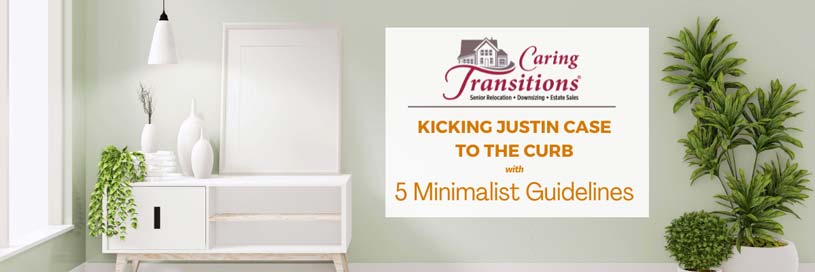
Everyone has met Justin Case. He's a bit of a downer and always gives us grief, trying to hold us back in our lives. But no matter how much we can't stand him being around, no matter how much shame and guilt he makes us feel, most of us struggle to get rid of him. Why? Because Justin Case is not a person, it's all our "just in case" clutter.
And it's time to kick that mindset to the curb!
As a society we have all fallen into the trap called fear of lack by saying, "Better to have it and not need it, than need it and not have it." Now, being prepared is important. You're not wrong. But there is a clear difference between holding onto the past or fearing the loss of access to something versus practical and realistic preparedness–a hypothetical future that may never happen.
Ask yourself these questions to help you start looking at your clutter in a new way:
- Have I used this in the last year?
- Do I have a purpose for holding on to this?
- Why am I keeping this?
If your answer to any of these questions is "No," or "I don't know," you don't need that item.
Once you've accepted that your clutter is truly a burden in your life, how can you start letting go and moving forward? One movement that's had a huge positive effect on thousands is called Minimalism. Over time, experts involved with this movement have created minimalist guidelines for others just like yourself to help declutter your home.
As you begin your decluttering journey, watch this video to learn 10 good habits for you to keep in mind.
Here are 5 easy minimalism guidelines you can use to start letting go of your clutter:
1. 1 Out, 1 In
The 1 In, 1 Out rule for minimalism is considered the simplest guideline you can follow. Put simply, you must get rid of one item for every new item you buy. But this rule can make it easy to justify bad spending habits. Instead, treating this as the "1 Out, 1 In" guideline is a better option(9). This way you must lose an item before you can bring a new one into your space.
2. 90/90
The 90/90 guideline is just asking yourself two questions about each item in your home.
a. Have I used these items in the last 90 Days?
b. Will I use this item in the next 90 days?
If the answer to both these questions is No, then you can safely toss or donate that item. If you think, yes, I might use this item and want to keep it "just in case," put it aside in a pile or write a list to keep that item in mind over the next 90 days. If you don't end up using that item, it is useless to you and should be removed from your space.
3. 20/20
Another simple guideline to start minimizing, is using the 20/20 method. Choose an item you're considering for decluttering. Ask: can I replace this item for under $20, in less than 20 minutes, from my current location? If the answer is yes, you should toss it. It's not important or useful enough to keep.
The important part of this is remembering frugality and practicality. This doesn't apply to food, generally affordable items, or ones with expiration dates. Those are meant to be tossed after use. This guideline is meant toward deliberate items with no limit or deadline, items that you will never use again. In other words, all your "Just In Case" clutter.
4. 10/10
This guideline is known as the 10/10 Materials Possession theory. List the 10 most expensive items you've purchased in the last decade. This could be anything from your degree to boots to a car. Do those items add value to your life? If not, consider decluttering them from your life.
The next step is listing 10 items that added the most value to your life in the last decade. It doesn't have to be physical, this could be an experience. As you go through this list, you may realize what you truly cherish most in life, such as spending time with loved ones or thrilling adventures. This is a great exercise in putting perspective on what matters most to our lives.
5. 30 Day Minimalism Challenge
If you really want to jump-start your decluttering journey, try the 30 Days Minimalism Challenge! For each day, you get rid of that # of items. For example, 1 item on Day 1, 2 items on Day 2, and so on, until 30 Items on Day 30. By the end, you'll have decluttered 450 items! Wow!
Keep in mind, this is a challenge and the difficulty will grow each day. But it's also great for those wanting to create a habit of decluttering and minimalism in their life.
Now that you understand the minimalist guidelines, remembering them throughout your decluttering journey will help keep that downer, Justin Case, on the curb and out of your life!
Sources:
- Minimalism and the 80/20 Rule (bellaorganizing.com)
- How Just In Case Traps Us Into A Clutter Filled Motherhood (motherhoodsimplified.com)
- the 80/20 rule (the pareto principle) (becomingminimalist.com)
- Use "The Minimalists'" 90/90 Rule to Help You Declutter | Apartment Therapy
- 10 Methods of Decluttering that Aren't Marie Kondo — the Pros & Cons | by Catherine N Wight | Medium
- 20/20 Rule Remove JUST IN CASE | Simple Minimalism Rule
- 10 Minimalist Habits
- 90/90 Minimalism Rule: Have You Used This For The Past 90 Days?
- 1-in-1-out rule: Simple Minimalism Rule